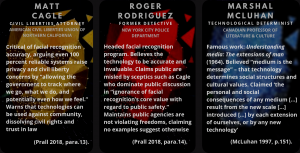The announcement of Australia’s first “smart city” includes a potentially Orwellian surveillance platform known as Switching on Darwin

A sly smile spread across my face when I learned the year of Michel Foucault’s death. I love entertaining coincidences, and there’s obviously not much space on the bookshelf between Discipline and Punish: The Birth of the Prison (Foucault 1995) and George Orwell’s Nineteen Eighty-four (1949). Big brother sits comfortably, probably asleep, in Jeremy Bentham’s (2011) late eighteenth-century panopticon tower, with the mere concept of surveillance assuring ‘the automatic functioning of power’ (1995, p.201).
Today, however, hotly debated technologies present more specialised concerns than Orwell’s text and we see Foucault’s concept of automation shifting, from within the subject, into the tower itself. Andrejevic (2019) suggests this is far from a displacement of traditional surveillance and represents a new development in automation, made possible by comprehensive data collection (p.7).
Dataveillance has emerged as a new entity (Clarke 1988), and deterrence has been updated through an increasing amount of activity predictability and automated retribution.
Despite concerns over the legitimacy of such metaphors, society has a long way to go before it reaches the totalitarian nightmare of Nineteen Eighty-four. Yet, we must accept that if the Chernobyl disaster couldn’t scare humanity away from nuclear research – a social credit system banning millions of Chinese people from public transport (Xu, Xiao 2018) won’t halt trends in modern surveillance.
In the hope that information wars are less horrific than those of violence, humanity is now challenged to influence positive change. Putting aside the implications of Edward Snowden’s case (Andrejevic 2019, Bennett 2015, van Dijck 2017) and the arrest of Julian Assange last month, it would appear that many people today can freely discuss the ethics of evolving societies, unlike Orwell’s characters.
The topic of surveillance is like Pandora’s box. Joining such a forum demands a balanced perspective between realms of privacy and modes of innovation. “Smart” technologies are products for our convenience that generate incredibly large amounts of what Roger Magoulascoined “Big Data” in 2005. Unlike the devices from which it’s collected, this data isn’t for the benefit of individuals who generate it. Much is used strategically by marketers, governments and hackers who pre-emptively capture Big Data for its potential value in the future (Curtis 2017, para.4).
Introducing facial recognition
Facial recognition technology (FRT) presents an obvious problem in that it’s still quite unreliable – the American Civil Liberties Union conducted a recent test of Amazon’s law enforcement program called Rekognition, which ‘falsely matched 28 members of Congress to criminal mugshots’ (Prall 2018, para.9). Two weeks ago, supervisors voted 8 to 1 – banning FRT in San Francisco (Conger 2019, para.18). New laws require that city departments establish usage policies and obtain board approval to continue using, or purchase any new surveillance technology (Har 2019, para.2).
The legislation was written by Brian Hofer, who is spearheading a recent wave of anti-surveillance policies across California. When asked about balancing perspective on the issue, Hofer stated that for the first time, he was aggressively drawing the line in face of “a dramatic shift” (Conger 2019, para.15). He identifies the abuse of state power as the biggest problem facing trends in surveillance and sees the most potential harm occurring through data mining and technology such as FRT (para.7).

Darwin’s new evolution
It was recently announced that all three levels of government have funded the development of Australia’s first “smart city”, including a $10M surveillance platform called Switching on Darwin (City of Darwin 2019). Council’s Innovation, Growth and Development Services manager, Josh Sattler said the system gathers data from poles fitted with Wi-Fi, speakers and CCTV cameras (Zwar 2019, para.3). This feeds software that includes FRT (Caruana 2019, para.3). The council intends to use data from pedestrian movements and mobile phones to analyse where and when people access certain websites or mobile apps in the city – sharing this information with businesses for marketing purposes (Zwar 2019, para.7).
Another feature of the platform is the ability to create “virtual fences” that detect unusual behaviour, known criminals or someone banned from entering a specific area (Caruana 2019, para.2). The software will know when a virtual fence has been breached and automatically alert authorities to investigate specific cameras and areas (Zwar 2019, para.4). The CCTV component was activated on ANZAC day, and the entire artificial intelligence platform will be operational by the end of this financial year.
Lecturer in law, Dr Jenny Ng advises that if Darwinians want high-security Wi-Fi networks, they will have to use personal systems that employ personalised features (Zwar 2019, para.7) such as a virtual private network (VPN). She also speculates the project has no intentions for a social credit system as we’ve seen in China and “thinks” it’s going to stay that way.
Thanks for the reassurance, Jenny.
Switching on Darwin deserves close critical attention in the interest of civil privacy rights because it’s hardly challenged by the likes of Brian Hofer. Considering current debates over Californian policy, alongside the less regulated practices gathering momentum in Australia, touches on the sense of balance required when navigating surveillance debates. We can expand on this by pitching ideologies as different colours on the spectrum.
Diagnosed with Labrynthitis
It’s by no means easy to summarise the intricacies of surveillance, and it’s argued that such a task fails to expose the myriad of subtle harms and social norms associated with informational and institutional relations (Bennett 2015, p.370). Van Dijck (2017) reminds us that ‘an interpretative frame always prefigures data analysis’ (p.201); one hand demands balance between pragmatics and gimmicks when adopting “smart” convenience, while the other hand forces us to question the interests of technology companies and their advocates.
In another sense, perspectives are always a matter of time, place and identity: if George Orwell were born in the Twenty-First Century and was yet to write what would be known as Two-thousand and Eighty-four, we can probably imagine it ending with Winston Smith, shuffling around Silicone Valley, muttering “I love Big Data”.
If we are to successfully navigate the unchartered future of surveillance, it’s imperative to keep open minds, balanced approaches and a touch of vigilance.
Because if “they” are going to watch our every move,
then we’d better start watching theirs.
Weighing up my options in the debate on surveillance.
— Kal Omari (@kal_omari) May 25, 2019
The Dead Kennedys say:
"Give me convenience or give me death."
I think that's a bit extreme... Can I just have some privacy, please?#Surveillance #Dataveillance #ALC708 pic.twitter.com/oH1KVcclUL
All images by Kal Omari:
Cagle, Rodriguez, McLuhan created @ Canva
Facial Recognition 2.0 (CC BY 2.0)
Foucault, Orwell and the Panophalopod (CC BY 2.0)
Image credits for video (with links):
Share this:
References (including video):
Andrejevic, M 2019, ‘Automating surveillance’, Surveillance and society, vol.17, no.1/2, pp.7-13, retrieved 8 May 2019, DOI: 10.24908/ss.v17i1/2.12930
Bennett, CJ 2015, ‘Trends in voter surveillance in western societies: Privacy intrusions and democratic implications’, Surveillance and society, vol.13, no.3/4, pp.370-84, retrieved 8 May 2019, DOI: 10.24908/ss.v13i3/4.5373
Bentham, J 2011, The panopticon writings, Bozovic, M (ed.), Verso, London
Caruana, A 2019, ‘China’s people monitoring software being deployed in Darwin’, Lifehacker, 30 April, retrieved 8 May 2019, https://www.lifehacker.com.au/ […]
City of Darwin 2019, ‘Switching on Darwin’, City of Darwin, retrieved 13 May 2019, https://www.darwin.nt.gov.au/ […]
Clarke, R 1988, ‘Information technology and dataveillance’, Communications of the ACM, vol.31, no.5, retrieved 29 November 2019, DOI: 10.1145/42411.42413
Conger, K 2019, ‘The man behind San Francisco’s facial recognition ban is working on more. Way more.’, The New York Times, 15 May, retrieved 15 May 2019, https://www.nytimes.com/ […]
Curtis 2017, ‘Monitoring, privacy and surveillance… within the smart home’, Modernity, Modern Human, 26 June, retrieved 18 May 2019, https://medium.com/modernity/ […]
Foucault, M 1995, Discipline and Punish: The Birth of the Prison, 2nd edn, Vintage Books, New York, retrieved 9 April 2019, https://monoskop.org/ […]
Har, J 2019, ‘San Francisco bans police use of face recognition technology’, ABC News, 14 May, retrieved 14 May 2019, https://abcnews.go.com/ […]
Introducing Sidewalk Toronto 2017, YouTube, Sidewalk Toronto, 17 October, retrieved 9 April 2019, https://www.youtube.com/ […]
Loffreda, D 2019, ‘Tomorrow’s cities: evolving from “smart” to adaptive’, Ciena, 16 April, retrieved 13 May 2019, https://www.ciena.com/ […]
McLuhan, M 1964, Understanding media: The extensions of man, McGraw-Hill Education, New York
McLuhan, M 1997, Essential McLuhan, McLuhan, E, Zingrone, F (eds.), Routledge, London
Mcdonald, L 2019, ‘Father of California man, 27, stabbed to death in Mexico while on vacation helps discover a breakthrough in the case after noticing transactions on his ATM card a month after the murder’, Daily Mail, 5 May, retrieved 8 May 2019, https://www.dailymail.co.uk/ […]
Orwell, G 1949, Nineteen Eighty-four, Secker & Warburg, London
Prall, D 2018, ‘The digital dragnet: How facial recognition technology, if left unchecked, could fundamentally change what it means to be an American’, American city and county, vol.133, no.8, retrieved 8 May 2019, https://www.americancityandcounty.com/ […]
Sidewalk Labs 2019, Sidewalk Labs is reimagining cities to improve quality of life, Sidewalk Labs, retrieved 9 April 2019, https://www.sidewalklabs.com/
Sidewalk Toronto 2019, Welcome to Sidewalk Toronto, Sidewalk Toronto, retrieved 9 April 2019, https://sidewalktoronto.ca/
van Dijck, J 2017, ‘Datafication, dataism and dataveillance: Big data between scientific paradigm and ideology’, Surveillance and society, vol.12, no.2, pp.197-208, retrieved 8 May 2019, DOI: 10.24908/ss.v12i2.4776
Vincent, D 2018, ‘Watchdog forum has its eyes on Sidewalk Labs Quayside development’, The Star, 26 October, retrieved 13 May 2019, https://www.thestar.com/ […]
Xu, VK, Xiao, B 2018, ‘China’s social credit system seeks to assign citizens scores, engineer social behaviour’, ABC News, 2 April, retrieved 8 May 2019, https://www.abc.net.au/news/ […]
Zwar, W 2019, ‘Darwin to build future on smart technology based on cities in China and Taiwan’, NT News, 9 April, retrieved 8 May 2019, https://www.ntnews.com.au/ […]

